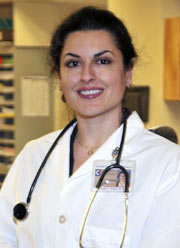Alumna physician to address Iran's education ban for Baha'is
By Linda B. Glaser

Dr. Haideh Sabet '95 is a woman with a mission: to restore the right of Baha'is in Iran to enroll at universities. She'll be on campus Friday, Feb. 17, to show and discuss "Education Under Fire," a new documentary about Iran's denial of higher education for Baha'is.
The event will be held at 7:30 p.m. in Hollis E. Cornell Auditorium in Goldwin Smith Hall; it is supported by 10 student organizations.
After the Islamic Revolution in 1979, says Sabet, Baha'i faculty and students were expelled from Iranian universities and have been barred from higher education ever since -- including many of Sabet's relatives. In 1987, the Baha'i community created the Baha'i Institute for Higher Education (BIHE), an underground university operating out of individual homes. BIHE offers more than 700 online courses, whose credits are accepted by more than 65 graduate programs worldwide, including Harvard University School of Graduate Education. Sabet, an assistant professor of neurology at the Georgetown University Medical Center in Washington, D.C., hopes to add Cornell to that list.
Recently the Iranian government cracked down on BIHE by raiding 39 homes, confiscating books and equipment and arresting 18 individuals. "They were charged with being part of a conspiracy against national security, but their only crime was education," says Sabet. Despite the risk of imprisonment and even death, BIHE faculty, both Baha'i and Muslim, continue to teach.
The Baha'i faith is not a sect of Islam, Sabet notes, but an independent world religion. "We believe in the unity of all faiths, the oneness of humanity, the equality of women and men, the harmony of science and religion, and the importance of universal education."
Given this emphasis on education, it's not surprising that Sabet was drawn to Cornell with its motto of "any person, any study."
"I thought, what a perfect place," she remembers. "I have such good memories of Cornell and what a caring and supportive environment it has," she says. "I had so many great mentors along the way who helped me reach my goals." She's returned to Cornell over the years, holding pizza parties and visiting former professors.
For Sabet, the warm environment of the Cornell Baha'i Club "felt like having a family away from home." Every week in the lounge of Balch Hall, they held "firesides," open discussions on such topics as the elimination of prejudice and the harmony of science and religion. Sabet will host similar talks with the Ithaca community during her upcoming visit, including one on "The Importance of Education: A Baha'i Perspective" Feb. 18 at 10:30 a.m. at the Ithaca Unitarian-Universalist Church Annex.
Sabet jokes that her career choice was inevitable, as she was literally born and raised in a hospital: both her parents are physicians. A biological sciences major at Cornell, Sabet attended the Mayo Medical School, where she became intrigued by the brain.
Actively engaged in recruiting students for Cornell, Sabet recently participated in the Cornell Alumni Leadership Conference. She's already made great progress with her 9-year-old son, who has a Cornell sign in his room and likes to sing the alma mater with his mother when she's driving.
"One of the highlights of my life is being educated at Cornell," says Sabet. "It makes me that much more impassioned to bring this cause to campus. I hope Iran will one day have a place where people of all backgrounds will work in a safe and nurturing environment like Cornell."
Linda B. Glaser is a staff writer for the College of Arts and Sciences.
Media Contact
Get Cornell news delivered right to your inbox.
Subscribe